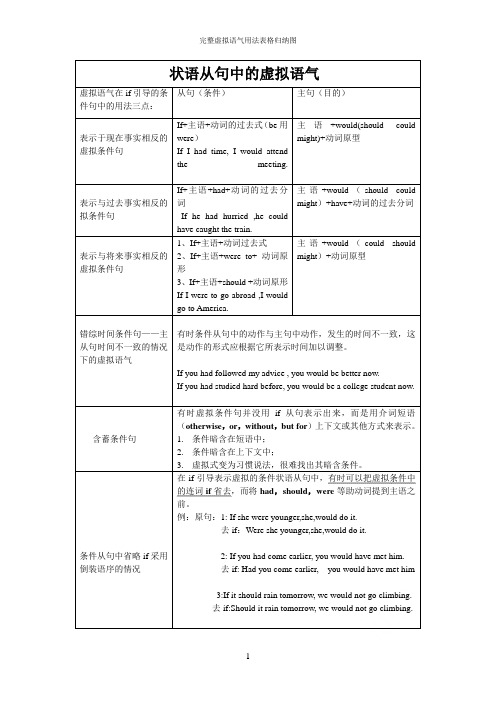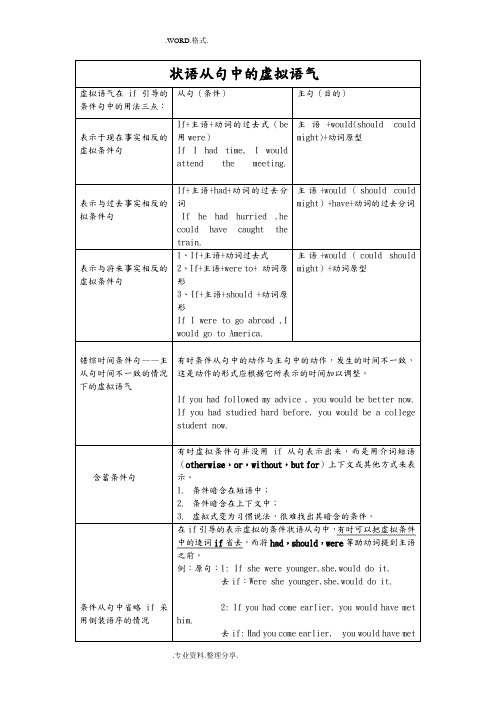完整虚拟语气用法表格归纳图8
完整虚拟语气用法表格归纳图

某些表示建议,请求,命令等主观意向名词做主语时,其后的表语从句或同位语从句需用虚拟语气
表达形式为should+动词原型或直接用动词原型。
My idea is that we (should ) think it over before accepting it.
We all agree to that suggestion that the meeting (should) be put off.
If you had followed my advice , you would be better now.
If you had studied hard before, you would be a college student now.
含蓄条件句
有时虚拟条件句并没用if从句表示出来,而是用介词短语(otherwise,or,without,but for)上下文或其他方式来表示。
1.条件暗含在短语中;
2.条件暗含在上下文中;
3.虚拟式变为习惯说法,很难找出其暗含条件。
条件从句中省略if采用倒装语序的情况
在if引导表示虚拟的条件状语从句中,有时可以把虚拟条件中的连词if省去,而将had,should,were等助动词提到主语之前。
例:原句:1: If she were younger,she,would do it.
The man insisted【坚持认为】that he had never stolen the money.
在expect,believe,think,suspect等动词的否定或疑问形式后的宾语从句中的虚拟语气
经常用“should+动词原型(或完成形式),表示惊奇,怀疑,不满等情绪。
(完整版)虚拟语气(表格整理)

虚拟语气(Subjunctive Mood)1.if(条件状语从句)2.wish(宾语从句)/if only(要是……就好了)3.would rather+ 从句(表示宁愿某人在现在或将来要做某事或过去做过某事)4.as if/as though,even if/though + 从句--------------------------------------------------------------------- 5.在表示“坚持、要求、命令、建议”之类的动词后的宾语从句中,用“(should)+动词原形”。
6.虚拟语气用于主语从句7.虚拟语气用于表语从句、同位语从句 [用(should)+动词原形]8.虚拟语气用于定语从句这种从句常用在It is (high) time (that)...句型中,定语从句的谓语动词用过去式或should + 动词原形(should不能省略,be用were来表示),意【好题珍藏】1.Grace doesn’t want to move to New York because she thinks if she there, she wouldn’t be able to see her parents very often. (Pano M6 P16:15) A.lives B.would live C.has lived D.were to live【解析】主句说明了客观事实,if从句是对将来事实的假设。
见“1.if(条件状语从句)——与将来事实相反”。
【答案】D2.If Mr.Dewey present,he would have offered any possible assistance to the people there. (Pano M6 P16:16) A.were B.had been C.should be D.was【解析】见“1.if(条件状语从句)——与过去事实相反”。
完整虚拟语气用法表格归纳图

状语从句中的虚拟语气虚拟语气在if引导的条件句中的用法三点:从句(条件)主句(目的)表示于现在事实相反的虚拟条件句If+主语+动词的过去式(be用were)If I had time, I wouldattend the meeting.主语+would(should couldmight)+动词原型表示与过去事实相反的拟条件句If+主语+had+动词的过去分词If he had hurried ,hecould have caught thetrain.主语+would(should couldmight)+have+动词的过去分词表示与将来事实相反的虚拟条件句1、If+主语+动词过去式2、If+主语+were to+ 动词原形3、If+主语+should +动词原形If I were to go abroad ,Iwould go to America.主语+would(could shouldmight)+动词原型错综时间条件句——主从句时间不一致的情况下的虚拟语气有时条件从句中的动作与主句中的动作,发生的时间不一致,这是动作的形式应根据它所表示的时间加以调整。
If you had followed my advice , you would be better now. If you had studied hard before, you would be a college student now.含蓄条件句有时虚拟条件句并没用if从句表示出来,而是用介词短语(otherwise,or,without,but for)上下文或其他方式来表示。
1.条件暗含在短语中;2.条件暗含在上下文中;3.虚拟式变为习惯说法,很难找出其暗含的条件。
条件从句中省略if采用倒装语序的情况在if引导的表示虚拟的条件状语从句中,有时可以把虚拟条件中的连词if省去,而将had,should,were等助动词提到主语之前。
虚拟语气表格归纳

示“以防,以免”等意思
由 “ providing ( that ) 根据情况,1.可以用虚拟语气。
/provided ( that ) /on
例:Suppose/Supposing that it rained, we shouldn’t go out.
condition that/suppose
三“建议”:suggest, propose, advise 面的宾语从句中的虚拟
语气
四“要求”:request, require, ask, demand
注意:suggest, insist 不表示建议或坚持要某人做某事时,即它们用于其本
意暗示,表明,坚持认为时,宾语从句用陈述语气。
在 expect , believe ,
表示建议,命令,请求,道歉,怀疑,惊奇等。
这类名词有:advice,decision,desire,demand,idea,order,pity,proposal,
recommendation,suggestion,surprise,wish,wonder 等。 在 “ It is (was)+ 名 词
的虚拟语气(注意与 wish…后的虚拟进行对 比)
注意:1.若某人愿自己做某事,would rather 后用动词原型 2.would rather…..than……中用动词原型
主语从句中的虚拟语气
“It is(was)+形容词(或 表达形式为 should+动词原形或省略 should
过去分词)+that….”结 常用的形容词:natural,appropriate,advisable,necessary,important,
(完整版)完整虚拟语气用法表格归纳图

在expect,believe,think,suspect等动词的否定或疑问形式后的宾语从句中的虚拟语气
经常用“should+动词原型(或完成形式),表示惊奇,怀疑,不满等情绪。
I cannot believe that you should think so.
在“It is (was)+名词+that…..”结构句中的虚拟语气
表示建议,命令,请求,道歉,怀疑,惊奇等。
It’s a pity that you (should) miss a good chance.
这类名词有:advice,decision,desire,demand,idea,order,pity,proposal,recommendation,suggestion,surprise,wish,wonder等。
“In case”引导的从句中即可用陈述句,也可以用虚拟语气
(should)+动词原型
例:1.The game will be put off in case it (should) snow.
2.The game will be put off in case it snows.
名词性从句中的虚拟语气
表示“要求”的:ask,desire, request,demand,require,beg
表示“同意,坚持”的:insist
表示“决定,命令”的:decide,order
注意:suggest,insist不表示建议或坚持要某人做某事时,即它们用于其本意暗示,表明,坚持认为时,宾语从句用陈述语气。
完整虚拟语气用法表格归纳图

表达形式为should+动词原形或省略should
It’s quite necessary that we should have a walk now.
常用的形容词:natural,appropriate,advisable,necessary,important,urgent,probable,possible,desirable,strange。
去if:Were she younger,she,would do it.
2: If you had come earlier, you would have met him.
去if: Had you come earlier, you would have met him
3:If it should rain tomorrow, we would not go climbing.
注意:1.在as if/as though句中,如果有可能成为事实,用陈述语气。
例:He looks2.as though或as if引导的状语从句,从句主语和主句主语相同时,从句中可省略主语和部分谓语。
虚拟语气用在lest,for fear that,so that及in order that引导的目的状语从句中表示“以防,以免”等意思
在“It is (was)+名词+that…..”结构句中的虚拟语气
表示建议,命令,请求,抱歉,疑心,惊奇等。
It’s a pity that you (should) miss a good chance.
这类名词有:advice,decision,desire,demand,idea,order,pity,proposal,recommendation,suggestion,surprise,wish,wonder等。
完整虚拟语气用法表格归纳图

状语从句中的虚拟语气虚拟语气在if引导的条件句中的用法三点:从句(条件)主句(目的)表示于现在事实相反的虚拟条件句If+主语+动词的过去式(be用were)If I had time, I wouldattend the meeting.主语+would(should couldmight)+动词原型表示与过去事实相反的拟条件句If+主语+had+动词的过去分词If he had hurried ,hecould have caught thetrain.主语+would(should couldmight)+have+动词的过去分词表示与将来事实相反的虚拟条件句1、If+主语+动词过去式2、If+主语+were to+ 动词原形3、If+主语+should +动词原形If I were to go abroad ,Iwould go to America.主语+would(could shouldmight)+动词原型错综时间条件句——主从句时间不一致的情况下的虚拟语气有时条件从句中的动作与主句中的动作,发生的时间不一致,这是动作的形式应根据它所表示的时间加以调整。
If you had followed my advice , you would be better now. If you had studied hard before, you would be a college student now.含蓄条件句有时虚拟条件句并没用if从句表示出来,而是用介词短语(otherwise,or,without,but for)上下文或其他方式来表示。
1.条件暗含在短语中;2.条件暗含在上下文中;3.虚拟式变为习惯说法,很难找出其暗含的条件。
条件从句中省略if采用倒装语序的情况在if引导的表示虚拟的条件状语从句中,有时可以把虚拟条件中的连词if省去,而将had,should,were等助动词提到主语之前。
完整虚拟语气用法表格归纳图

that-clause句型中从句用(should )+动词原型
It is demanded that we should work out a plan.
这类名词罕见的有:demand,desire,requirement,advice,recommendation,suggestion,order,necessity,proposal,plan,idea。
注意:1.在as if/as though句中,如果有可能成为事实,用陈述语气。
例:He looks as if he going to be ill.
2.as though或as if引导的状语从句,从句主语和主句主语相同时,从句中可省略主语和部分谓语。
虚拟语气用在lest,for fear that,so that及in order that引导的目的状语从句中暗示“以防,以免”等意思
注意:在上述所列形容词后面用that引出的宾语从句中,谓语动词也要用虚拟语气。
例:I don’t think it advisable that tom be assigned to the job since he has no experience.(汤姆缺乏经验,指派他做这项工作我认为是不恰当的).
在“It is (was)+名词+that…..”结构句中的虚拟语气
暗示建议,命令,请求,道歉,怀疑,惊奇等。
It’s a pity that you (should) miss a good chance.
这类名词有:advice,decision,desire,demand,idea,order,pity,proposal,recommendation,suggestion,surprise,wish,wonder等。
完整虚拟语气用法表格归纳图

完整虚拟语⽓⽤法表格归纳图虚拟语⽓在as if/as though引导的⽅式状语从句中1.表⽰与现在事实相反或对现在情况有怀疑,谓语动词⽤过去式。
He treats the boy as if he were his own son.2.表⽰与过去事实相反,谓语动词⽤过去完成时。
He spoke as if he had known about it.3.表⽰与将来事实相反,(表⽰将来的可能性不⼤),⽤would (might, could)+动词原形He acts as if he could win in the game .注意:1.在as if/as though 句中,如果有可能成为事实,⽤陈述语⽓。
例:He looks as if he going to be ill.2.as though或as if引导的状语从句,从句主语和主句主语相同时,从句中可省略主语和部分谓语。
虚拟语⽓⽤在lest,for fear that,so that及inorder that引导的⽬的状语从句中表⽰“以防,以免”等意思谓语动词多⽤should/could/might+动词原型构成For fear that it may rain tomorrow, we should bring an umbrella.由“providing(that)/provided(that)/on condition that/suppose (that)/supposing (that)”引导的条件从句根据情况,1.可以⽤虚拟语⽓。
例:suppose/supposing that it rained,we shouldn’t goout.2.也可以⽤陈述语⽓。
例:They are willing to surrender provided they aregiven free pardon..“In case”引导的从句中即可⽤陈述句,也可以⽤虚拟语⽓(should)+动词原型例:1.The game will be put off in case it (should) snow.2.The game will be put off in case it snows.名词性从句中的虚拟语⽓⼀:宾语从句中的虚拟语⽓1.在动词wish/hope 后的宾语从句中的虚拟语⽓,表⽰⼀种不可能实现的愿望。
完整虚拟语气用法表格归纳图

表示“决定,命令”的:decide,order
注意:suggest,insist不表示建议或坚持要某人做某事时,即它们用于其本意暗示,表明,坚持认为时,宾语从句用陈述语气。
The smile on his face suggested(暗示) that he was satisfied with our work.
表达形式为should+动词原形或省略should
It’s quite necessary that we should have a walk now.
常用的形容词:natural,appropriate,advisable,necessary,important,urgent,probable,possible,desirable,strange。
在“It is (was)+名词+that…..”结构句中的虚拟语气
表示建议,命令,请求,道歉,怀疑,惊奇等。
It’s a pity that you (should) miss a good chance.
这类名词有:advice,decision,desire,demand,idea,order,pity,proposal,recommendation,suggestion,surprise,wish,wonder等。
对将来情况的虚拟:从句谓语“would/should/could/might+动词原形”。
I wish (that) I would\could go.
在表示建议,命令,要求,忠告,等动词的后面的宾语从句中的虚拟语气
均以“should+动词原型”表示这种语气,“should”常被省略。
虚拟语气语法总结表格

虚拟语气语法总结表格
一、虚拟语气的基本概念
定义:用于表达假设、愿望或与现实相反的情况。
二、虚拟语气的类型
1. 现在虚拟语气
- 结构:动词原形(如:If I were you)
2. 过去虚拟语气
- 结构:had + 过去分词(如:If I had known)
3. 未来虚拟语气
- 结构:would + 动词原形(如:If I should win)
三、常用句型
1. 条件句
- 形式:If + 主语 + 虚拟动词,主句 + would/could/might + 动词原形2. 愿望句
- 形式:I wish + 主语 + 过去时/过去完成时
3. 建议句
- 形式:It is recommended that + 主语 + 动词原形
四、注意事项
1. 在条件句中,主句和从句的时态需要一致。
2. “were”用于所有人称,尤其在正式语境中。
总结人(签名):____________________
总结日期:____________________。
完整虚拟语气用法表格归纳图

状语从句中的虚拟语气虚拟语气在if引导的条件句中的用法三点:从句(条件)主句(目的)表示于现在事实相反的虚拟条件句If+主语+动词的过去式(be用were)If I had time, I would attendthe meeting.主语+would(should couldmight)+动词原型表示与过去事实相反的拟条件句If+主语+had+动词的过去分词If he had hurried ,he couldhave caught the train.主语+would(should couldmight)+have+动词的过去分词表示与将来事实相反的虚拟条件句1、If+主语+动词过去式2、If+主语+were to+ 动词原形3、If+主语+should +动词原形If I were to go abroad ,I wouldgo to America.主语+would(could shouldmight)+动词原型错综时间条件句——主从句时间不一致的情况下的虚拟语气有时条件从句中的动作与主句中的动作,发生的时间不一致,这是动作的形式应根据它所表示的时间加以调整。
If you had followed my advice , you would be better now.If you had studied hard before, you would be a college student now.含蓄条件句有时虚拟条件句并没用if从句表示出来,而是用介词短语(otherwise,or,without,but for)上下文或其他方式来表示。
1.条件暗含在短语中;2.条件暗含在上下文中;3.虚拟式变为习惯说法,很难找出其暗含的条件。
条件从句中省略if采用倒装语序的情况在if引导的表示虚拟的条件状语从句中,有时可以把虚拟条件中的连词if省去,而将had,should,were等助动词提到主语之前。
- 1、下载文档前请自行甄别文档内容的完整性,平台不提供额外的编辑、内容补充、找答案等附加服务。
- 2、"仅部分预览"的文档,不可在线预览部分如存在完整性等问题,可反馈申请退款(可完整预览的文档不适用该条件!)。
- 3、如文档侵犯您的权益,请联系客服反馈,我们会尽快为您处理(人工客服工作时间:9:00-18:30)。
Even if he were here, he could not solve the problem.
Even if I had bee n busy the n, I would have helped
you.
Choose the best an swer:
It is stra nge that the little boy speak two foreig n Ian guages.
A. could b. can C. should D. would
2. He gave orders that the experime nt before 5:30pm.
A. be fini shed
B.will finish
C. must be fini shed
3. He ____ you more help,eve n though he was very busy.
A, might have give n B. might give C .may have give n
4. Without the leadership of the Party,there no New Chi na.
A.would be
B. has bee n
C. should be
D.was
5. He is talk ing so much about America as if he there.
had bee n B. has bee n
C. was
D. has gone
6. The young man in sisted that he _ no thi ng
wrong and ______ f ree.
A. did; set
B. had done; should be set
C. should do; be set
D. had done; must be set
7. Had you liste ned to the doctor, you a ll
right now.
are B. were C. would be
D. would have bee n
8. You _____ come earlier. The bus left a mome nt
ago.
A. would
B. should have
C. may
D. have
表示一种让步语气, 即使…也做不成某事。
表示现在的情况,应用过去式
表示过去的情况,应用过去完成时态
CAAA ABCB。
